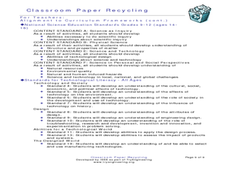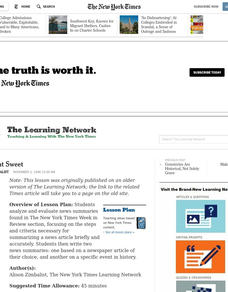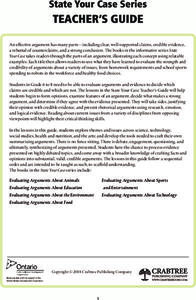Institute of Electrical and Electronics Engineers
Try Your Hand at Nano
Fascinating reading about nanotechnology, nanoscale properties, and liquid crystals precedes a fun activity for young engineers. They measure their hands in nanometers, research, and then investigate how heat effects a sheet containing...
Institute of Electrical and Electronics Engineers
Sugar Crystal Challenge
Blow your learners' minds with a sweet lesson on nanotechnology that uses sugar to demonstrate the difference nanoscale surface area makes in dissolving and crystal formation. Plenty of supportive background information is read to...
Institute of Electrical and Electronics Engineers
Tinkering with Tops
Get kids' heads spinning by challenging them to design a top that will rotate for a minimum of 10 seconds without leaving a 30-cm circle. Groups of learners collaborate through a planning stage, testing stage, and evaluation stage. Some...
Curated OER
"I Can” Common Core! 6th Grade Reading
It is much easier for kids to know they have reached a goal when that goal is clearly defined. By providing sixth graders with a checklist of Common Core reading standards written in "I can" format, each child can keep track of his own...
Institute of Electrical and Electronics Engineers
Classroom Paper Recycling
After reading about the history and recycling of paper, creative crafters collaborate to think of a new process for making recycled paper. A complete teacher's guide and student worksheets are included. There is no written procedure for...
Institute of Electrical and Electronics Engineers
Nano Waterproofing
This lesson plan will make an impact, especially on scientist-athletes who may have an interest in waterproof clothing! Acting as materials engineers, they work collaboratively on waterproofing pieces of cotton fabric. This challenge is...
Institute of Electrical and Electronics Engineers
Telescoping Periscope
Ahoy, matey! Here is an engineering expedition that mini mariners are sure to be swept away by! After reading a brief description and history of periscopes, they work in crews to construct one. Use this activity to enhance a lesson on...
Institute of Electrical and Electronics Engineers
Filtration Investigation
Scholars build a simple filtration system to remove impurities from muddy water and rate the filtered water to a grade of clarity scale. The focus is on teamwork and problem solving. This instructional activity would be effective in your...
Institute of Electrical and Electronics Engineers
Exploring at the Nanoscale
Nano-nano! Nanotechnology can seem like it's from another planet! After learning about this tiny technology, collaborative groups experiment with how smaller particles affect chemical reactions. They do this by immersing a whole and a...
Institute of Electrical and Electronics Engineers
Working with Watermills
In collaborative groups, emerging engineers or environmental scientists plan and construct a water wheel or watermill that rotates for a total of three minutes. Everything you need to carry out this instructional activity is included:...
Curated OER
Short But Sweet
After analyzing and evaluating news summaries found in the New York Times "Week in Review" section, middle schoolers study the steps for summarizing a news article briefly and accurately. They write two news summaries: one on a newspaper...
Curated OER
Youth Obesity: Schools Fight Back
Kids fight obesity by comparing the USDA food intake suggestions to what they personally consume throughout the day. They watch a video, read texts, and explore related vocabulary which they use as they compose an oral presentation.
Curated OER
Experience and Perspective
Sixth graders make connections between past experiences and perspective. They read Keeping the Night Watch by Hope Anita Smith. Then, they analyze a character's history and state the past experiences that form their perspective. In the...
Curated OER
What's the Author's Purpose?
What is the author's purpose for sharing an autobiography? Start this lesson plan with the short story provided about getting pulled over by a police officer. Then, discuss the acronym PIES and how it stands for the four main reasons an...
Curated OER
How Will We Create a Future without Waste?
Many young people act globally by reducing, reusing, and recycling, Now they take it to the next level by upcycling. Middle schoolers design a proposal to eliminate waste by exploring the new material cycle and applying their knowledge...
Angel Island Immigration Station Foundation
Conditions in China: Why Might One Leave Home Forever?
Primary source texts provide scholars with the background information they need to understand why Chinese peasant farmers were driven to emigrate. After underlining keywords, phrases, and/or lines in the texts, individuals craft a...
Humane Education Advocates Reaching Teachers
Justice for All - Educating Youth for Social Responsibility: Grades 6-8
Teach middle schoolers how to develop healthy relationships with activities and lessons designed to create a kind and inclusive
classroom. Pupils create guidelines to develop a safe and civil learning environment. They learn how to...
DocsTeach
Patent Analysis: Alexander Graham Bell's Telephone
Believe it or not, the plugs and wires on Alexander Graham Bell's patent application for telegraph improvements has a direct connection to devices today. Young historians examine the fine details of the patent application. After they...
Crabtree Publishing
State Your Case Series
Four lessons make up a unit focused on writing persuasive essays. Each unit builds on the last, ultimately taking pupils through the writing process. Scholars make a claim, create an argument, debate both sides, then state their opinion....
EngageNY
Introducing World without Fish
One fish, two fish, red fish, no fish. Scholars analyze World without Fish to determine the gist, identify vocabulary, and answer text-dependent questions. As learners read, they use sticky notes to annotate the text. They also work in...
EngageNY
Reading for Gist and Answering Text-Dependent Questions: Chapter 5 of World without Fish
Discover the rules of fishing. Pupils read chapter five of World without Fish to discover ideas about the rules and laws of fishing. They use sticky notes to annotate text as they read about fishing in other countries. They focus on the...
EngageNY
Tracing the Idea of Fish Depletion: Chapter 2
Scholars read chapter two of World without Fish to learn more about the fishing industry. Learners discuss in triads what it means for fishing to become an industry. They then write the gist of pages 28-33 on sticky notes and answer...
EngageNY
Introduction: The Ideas of Charles Darwin
Piece by piece ... Scholars read the text World without Fish by breaking the text into pieces. They identify challenging words and determine the gist of each section as they read. They then work together in triads to answer...
EngageNY
Researching: Eyewitness Accounts, Part 2
Continue on. Learners continue with the work they began in the last lesson looking for quotes to complete an eye witness interview. Pupils work in their groups to examine the texts in their research folders and The Great Earthquake and...





















